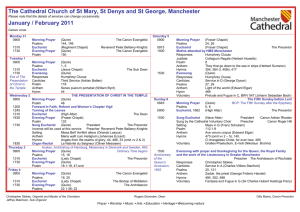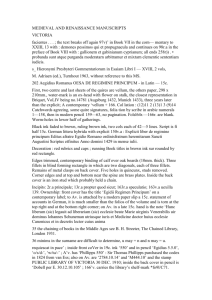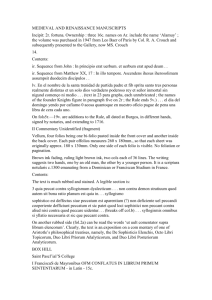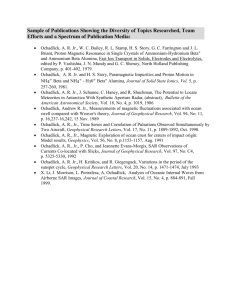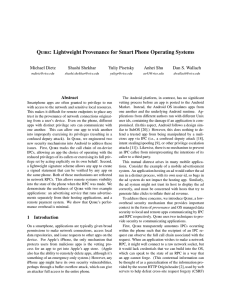MEDIEVAL AND RENAISSANCE MANUSCRIPTS
advertisement
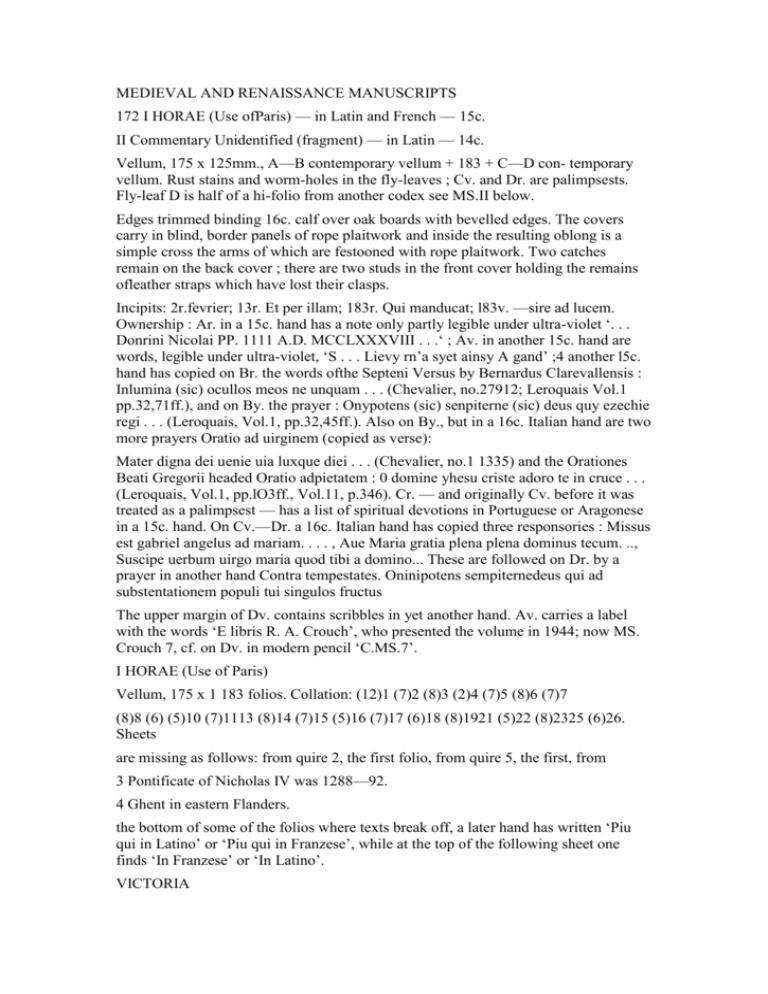
MEDIEVAL AND RENAISSANCE MANUSCRIPTS 172 I HORAE (Use ofParis) — in Latin and French — 15c. II Commentary Unidentified (fragment) — in Latin — 14c. Vellum, 175 x 125mm., A—B contemporary vellum + 183 + C—D con- temporary vellum. Rust stains and worm-holes in the fly-leaves ; Cv. and Dr. are palimpsests. Fly-leaf D is half of a hi-folio from another codex see MS.II below. Edges trimmed binding 16c. calf over oak boards with bevelled edges. The covers carry in blind, border panels of rope plaitwork and inside the resulting oblong is a simple cross the arms of which are festooned with rope plaitwork. Two catches remain on the back cover ; there are two studs in the front cover holding the remains ofleather straps which have lost their clasps. Incipits: 2r.fevrier; 13r. Et per illam; 183r. Qui manducat; l83v. —sire ad lucem. Ownership : Ar. in a 15c. hand has a note only partly legible under ultra-violet ‘. . . Donrini Nicolai PP. 1111 A.D. MCCLXXXVIII . . .‘ ; Av. in another 15c. hand are words, legible under ultra-violet, ‘S . . . Lievy rn’a syet ainsy A gand’ ;4 another l5c. hand has copied on Br. the words ofthe Septeni Versus by Bernardus Clarevallensis : Inlumina (sic) ocullos meos ne unquam . . . (Chevalier, no.27912; Leroquais Vol.1 pp.32,71ff.), and on By. the prayer : Onypotens (sic) senpiterne (sic) deus quy ezechie regi . . . (Leroquais, Vol.1, pp.32,45ff.). Also on By., but in a 16c. Italian hand are two more prayers Oratio ad uirginem (copied as verse): Mater digna dei uenie uia luxque diei . . . (Chevalier, no.1 1335) and the Orationes Beati Gregorii headed Oratio adpietatem : 0 domine yhesu criste adoro te in cruce . . . (Leroquais, Vol.1, pp.lO3ff., Vol.11, p.346). Cr. — and originally Cv. before it was treated as a palimpsest — has a list of spiritual devotions in Portuguese or Aragonese in a 15c. hand. On Cv.—Dr. a 16c. Italian hand has copied three responsories : Missus est gabriel angelus ad mariam. . . . , Aue Maria gratia plena plena dominus tecum. .., Suscipe uerbum uirgo maria quod tibi a domino... These are followed on Dr. by a prayer in another hand Contra tempestates. Oninipotens sempiternedeus qui ad substentationem populi tui singulos fructus The upper margin of Dv. contains scribbles in yet another hand. Av. carries a label with the words ‘E libris R. A. Crouch’, who presented the volume in 1944; now MS. Crouch 7, cf. on Dv. in modern pencil ‘C.MS.7’. I HORAE (Use of Paris) Vellum, 175 x 1 183 folios. Collation: (12)1 (7)2 (8)3 (2)4 (7)5 (8)6 (7)7 (8)8 (6) (5)10 (7)1113 (8)14 (7)15 (5)16 (7)17 (6)18 (8)1921 (5)22 (8)2325 (6)26. Sheets are missing as follows: from quire 2, the first folio, from quire 5, the first, from 3 Pontificate of Nicholas IV was 1288—92. 4 Ghent in eastern Flanders. the bottom of some of the folios where texts break off, a later hand has written ‘Piu qui in Latino’ or ‘Piu qui in Franzese’, while at the top of the following sheet one finds ‘In Franzese’ or ‘In Latino’. VICTORIA quire 7, the sixth, from quire 9, the second and eighth, from quire 10, the sixth and possibly two more, from quire 11, the fifth, from quire 12, the fourth, from quire 13, the first, from quire 15, the fifth, from quire 16, the first, fifth and eighth, from quire 17, the fifth, from quire 18, the third and sixth, while quire 22 lacks its first, second and third sheets. No catchwords or foliation, but there are quire signatures in the lower left-hand recto corners. Pagination is by modern pencil in arabic numerals by tens for the first half of the volume, then inter— mittently. Fols28r.—29v. are ruled, but blank. There are worm-holes in the covers, in A—B and in 1—3. Black ink, fading to brown, ruling red ink, one col. ofl6 lines. Script is 15c. French littera gothica textualisformata. Decoration : red, blue, and gold entries in the Calendar ; red rubrics ; caps and fill-ins in gold, red, and blue, with white tracery. Many large initials have marginal sprays. All the miniatures and historiated letters have been removed. Contents: ir. Calendar (in French) 13r. Obsecro te, opening abruptly : Et per illam sanctam . . . (14r.) sum facturus locuturus . . Leroquais, Vol.1, pp.l5ff., Vol.11, p.346. . iSv. 0 intemerata . . . (17r.) michi peccatori . . Leroquais, Vol.1, pp.l6ff., Vol.11, p.336 ; Wilmart, pp.474—504. 19v. Sequences ofthe Gospels 24v. [ Athanasii.] Quicumque uult saluus esse . . Migne PL, Vol.LXXXVIII, 585—6 ; Chevalier, no.16567 ; Leroquais, Vol.1, pp.l24,237ff. 30r. Hours of the Virgin. Matins (30r.—49v.) begin abruptly in vs.3 of Venite exulternus with : Quoniam deus magnus . . ., hymn 0 quam glor(fica (31r.), ps.ant.Exaltata [ (31v.), nine lessons, and breaking off in the Te Deum with: Et laudamus nomen tu-; lauds (50r.—60v.) open with the eighth word : me festina . . ., have capit. Te laudant angeli (57v.), hymn Virgo dei genitrix (58r.), collect Concede nos (60r.) ; prime (61r.—65v.) begins in vs.2 of hymn Memento salutis auctor with : protege. et hora . . . , contains ps.ant. Benedicta tu (61r.), capit. Felix namque (64v.) ; tierce (66r.—70v.) begins abruptly in vs.2 of hymn Memento salutis auctor with : protege et hora . . and ends in the prayer Ecclesiam tuam quesumus domine benignus with: Ut beati iohannis apostoli; no sext; none (71r.—74v.) opens at the eighth word: me festina. . has ps.ant.Sicut lilium (71v.), capit. Per te dei genitrix (73v.); vespers (75r.—80v.) begin in vs.4 of ps. Let atus sum in his que dicta sunt with: tribus tribus domini . . .; compline (81r.—84v.) starts near the beginning at: usquequo exaltabitur . . 85r. Penitential psalms, opening in vs.7 of the first ps. at the words Turbatus est. 96r. Litany 6 is difficult to decide whether the original gathering had six or eight folios. 28()

